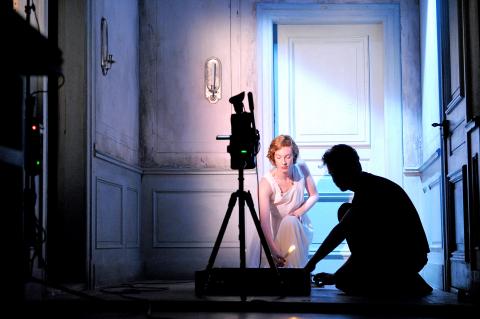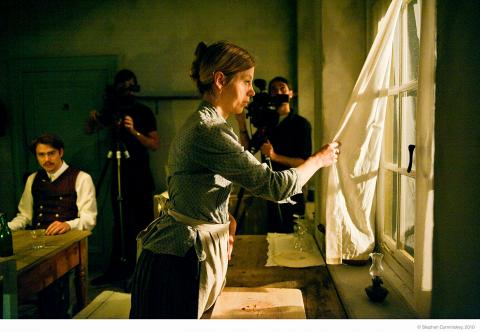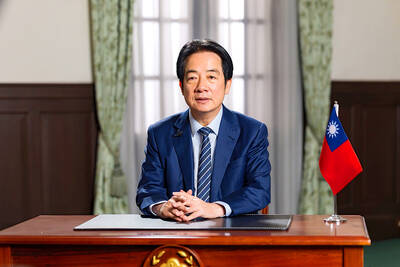Swedish author and playwright August Strindberg’s groundbreaking look at class differences, sexual politics and theater staging, Miss Julie, has been dissected, analyzed, criticized and reworked in various genres since it was written in 1888.— as has he.
For generations, stage and film directors around the world have given their takes on his story of an aristocrat, Miss Julie, and her encounters with her father’s manservant, Jean, after an alcohol-fueled Midsummer Eve’s party and the repercussions for all involved.
British theater and opera director Katie Mitchell gained fame for her multi-media works and for telling stories from a female perspective, and her 2010 production of Miss Julie for Berlin’s Schaubuhne theater was no exception.

Photo courtesy of Thomas Aurin
Her production will be performed at the National Theater in Taipei this weekend, for three shows starting tomorrow night.
Alhough Mitchell has worked primarily in Europe in recent years, Miss Julie was her first in Berlin and her first for the Schaubuhne, which was founded in 1962.
Thomas Ostermeier, who took over as Schaubuhne’s artistic director in 1999, turned it into a repertory-style theater with a permanent ensemble of actors. The cast that will be performing at the National Theater is largely the original one, with Jule Bowe reprising her role as Kristin, with Tilman Strauss as Jean and Luise Wolfram and Miss Julie.

Photo courtesy of Stephen Cummiskey
The big difference with Mitchell’s take on Strindberg’s play is that she utilized a film crew on stage to capture the action, and shifted the focus of the story to the perspective of what was traditionally one of the minor characters, the family cook Christine (Kristin in this production), who is Jean’s fiance and a witness, albeit sometimes a sleeping one, to Julie and Jean’s pursuit of one another.
Mitchell tapped Leo Warner, cofounder of the Britain-based Fifty Nine Productions and a frequent collaborator, to work with her on the live video side of the production and they share director credits for the show.
Mitchell and Warner have been credited with pioneering a new medium — “live cinema” and that concept seems well-suited for Miss Julie because Strindberg’s play was conceived as a new medium, a call to revolution of the standard Swedish theater conventions of his day. He wanted to see theater that was as natural as possible, free from all artifice, because he fell that this would lead to a greater understanding of humanity.
By using a black-clad film crew to provide video footage of the stage action, the audience is provided with a much closer look at the character’s actions and interactions as they occur on stage.
There are a couple of caveats that come along with this Miss Julie production. One is that it is not suitable for those under the age of 12, which one would think would be self-evident. The others are that there is partial nudity, and that latecomers might not be admitted.
The play runs 75 minutes and will be performed in German with Chinese and English surtitles.
There will be a post-show discussion in the theater lobby after Sunday’s matinee.

This month the government ordered a one-year block of Xiaohongshu (小紅書) or Rednote, a Chinese social media platform with more than 3 million users in Taiwan. The government pointed to widespread fraud activity on the platform, along with cybersecurity failures. Officials said that they had reached out to the company and asked it to change. However, they received no response. The pro-China parties, the Chinese Nationalist Party (KMT) and Taiwan People’s Party (TPP), immediately swung into action, denouncing the ban as an attack on free speech. This “free speech” claim was then echoed by the People’s Republic of China (PRC),

Most heroes are remembered for the battles they fought. Taiwan’s Black Bat Squadron is remembered for flying into Chinese airspace 838 times between 1953 and 1967, and for the 148 men whose sacrifice bought the intelligence that kept Taiwan secure. Two-thirds of the squadron died carrying out missions most people wouldn’t learn about for another 40 years. The squadron lost 15 aircraft and 148 crew members over those 14 years, making it the deadliest unit in Taiwan’s military history by casualty rate. They flew at night, often at low altitudes, straight into some of the most heavily defended airspace in Asia.

Many people in Taiwan first learned about universal basic income (UBI) — the idea that the government should provide regular, no-strings-attached payments to each citizen — in 2019. While seeking the Democratic nomination for the 2020 US presidential election, Andrew Yang, a politician of Taiwanese descent, said that, if elected, he’d institute a UBI of US$1,000 per month to “get the economic boot off of people’s throats, allowing them to lift their heads up, breathe, and get excited for the future.” His campaign petered out, but the concept of UBI hasn’t gone away. Throughout the industrialized world, there are fears that

The Democratic Progressive Party (DPP) controlled Executive Yuan (often called the Cabinet) finally fired back at the opposition-controlled Legislative Yuan in their ongoing struggle for control. The opposition Chinese Nationalist Party (KMT) and Taiwan People’s Party (TPP) acted surprised and outraged, but they should have seen it coming. Taiwan is now in a full-blown constitutional crisis. There are still peaceful ways out of this conflict, but with the KMT and TPP leadership in the hands of hardliners and the DPP having lost all patience, there is an alarming chance things could spiral out of control, threatening Taiwan’s democracy. This is no